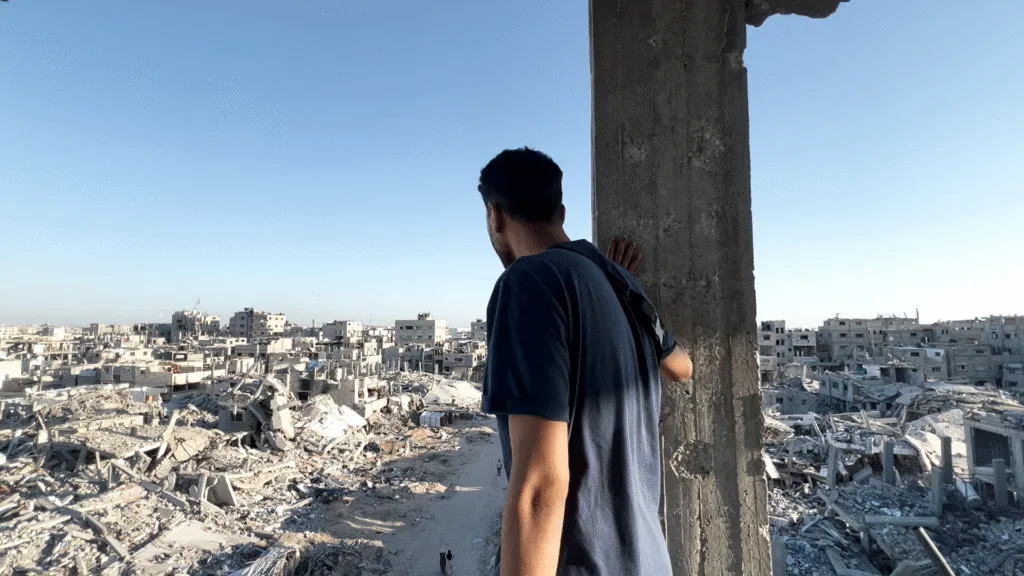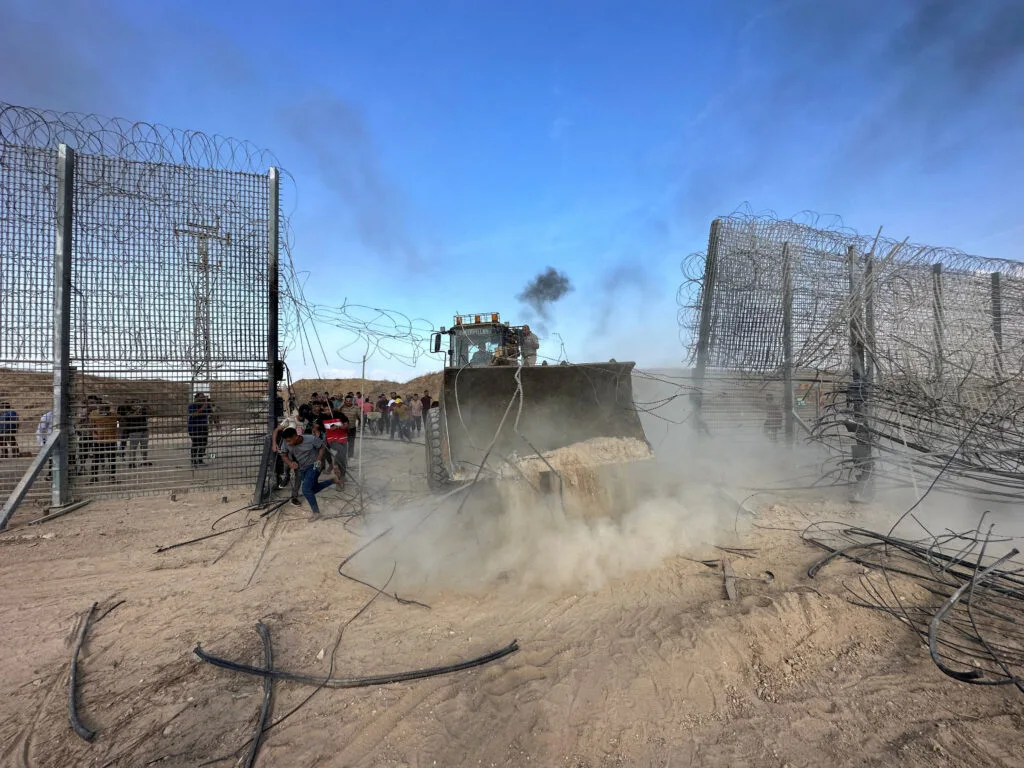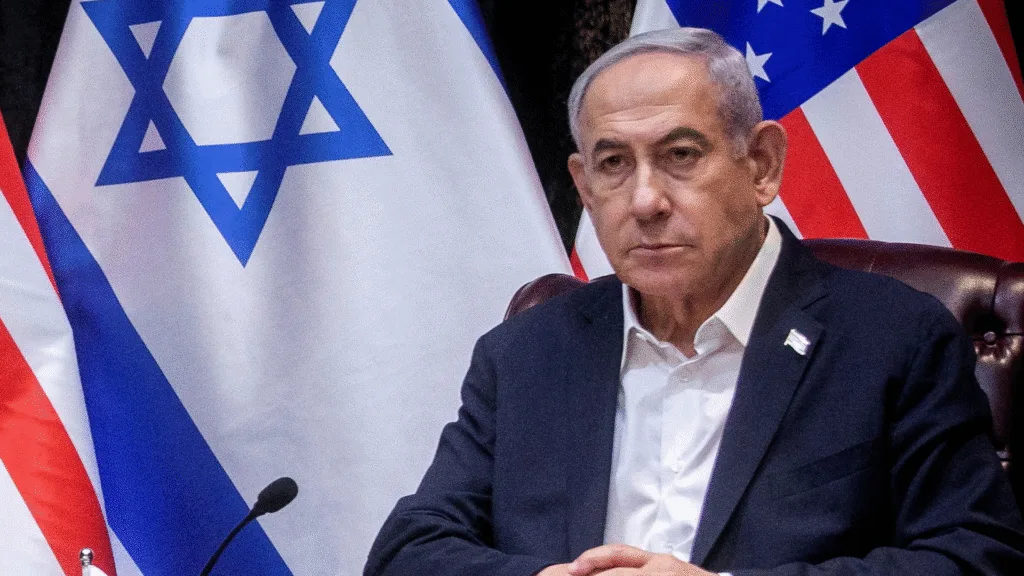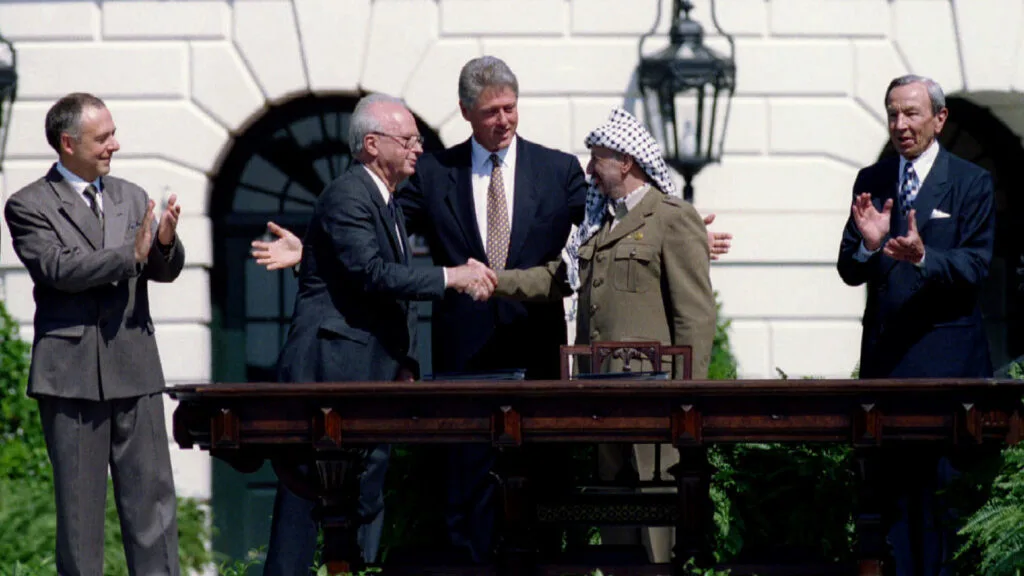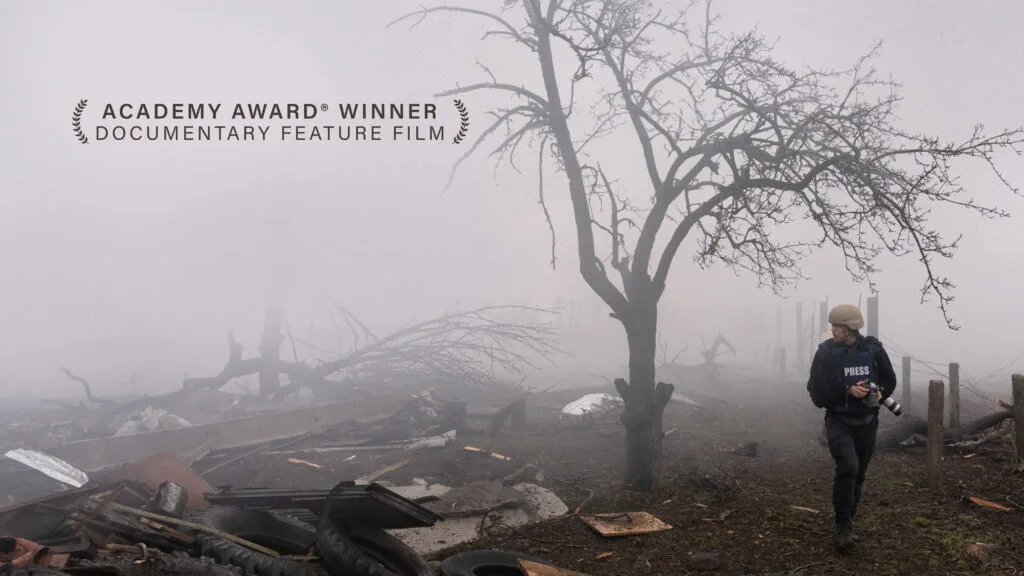Dana Weiss
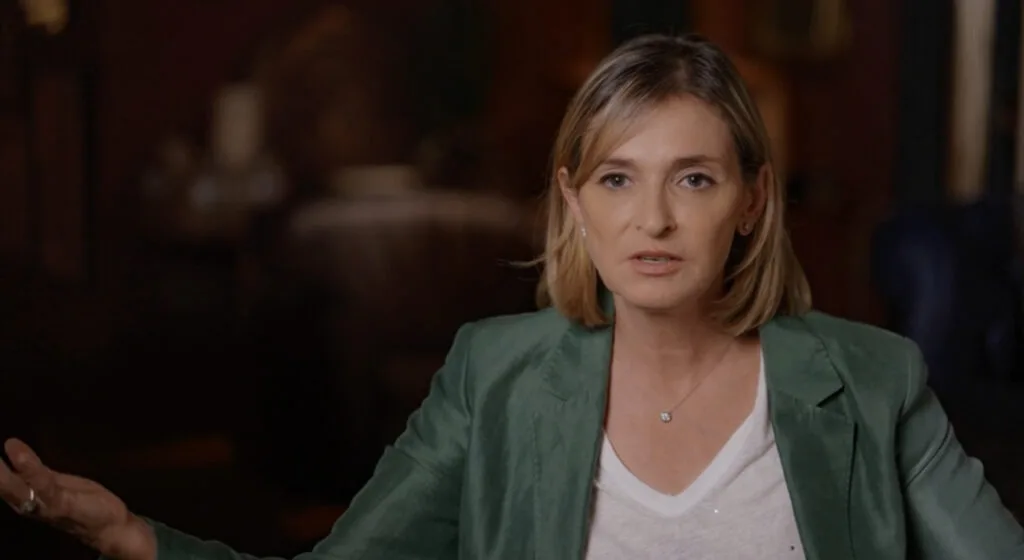
December 19, 2023
Share
Dana Weiss is an Israeli journalist, serving as political and diplomatic correspondent for Channel 12 in Israel. She has reported on political and international affairs, including the Israeli-Palestinian conflict, for nearly three decades.
The following interview was conducted by FRONTLINE journalist James Jacoby on Nov. 16, 2023. It has been edited for clarity and length.
Read more interviews from Netanyahu, America & the Road to War in Gaza.
Let’s start with 2015. What was significant about the shift that you saw in [Israeli Prime Minister Benjamin] Netanyahu in 2015? And why is it significant in retrospect to see what was beginning in terms of his political evolution or what was mounting in terms of his political evolution at that point?
I think the elections of 2015 were a tipping point. Netanyahu has always been a very suspicious politician and a very successful politician because he always managed to understand the sentiment, answer the sentiment of the voters and be ahead of his other opponents. That was his secret sauce. And in 2015, he won with a landslide despite all the analysis about it.
I think in 2015, he felt that he won big, and it was his victory, his personal victory. It wasn’t about anything else except Netanyahu being able to beat everyone else. And something there snapped. Something there changed. I think he became more suspicious, more confident and more, I would say, disrespectful for all the other political players. At that point, when he said, “It was my victory,” when his family said, “It was your victory; you did it by yourself; you did it because you’re Benjamin Netanyahu, because you have these secret ingredients, because you have a special contract with the Israeli public,” he felt that he didn’t need to listen to all the people around him. He didn’t need anyone to tell him the other truth. He didn’t need to rely on anyone else because they were all wrong and he was right because it was his instincts that proved him right. … So at that point, I think, is where Netanyahu all of a sudden started to believe that he is the magician everyone said he was.
And in terms of who his constituency was, I mean, there was also a turn to the right as well, right? In terms of his vision of who he was for Israel at this point in time, as kind of the savior of a bigger concept, can you just tell me a little bit about how he was conceiving of himself and who he was really speaking to in terms of an Israeli audience?
One of his closest advisers who has been with him from the start was also a member of the greater Likud family, the right wing. One of his closest advisers in 2015 actually came up to him and said, “Look, Bibi”—that’s how he called him—“I really advise you to take this term and treat it as if it was your last term. Then you can go down in history. You can make a peace agreement; you can go and do something with Palestinians; you can change the region. But you have to treat it as your last term, and therefore you won’t be held back by all the small political needs that you will have to go to the right and go to the ultra-Orthodox and always be wary about the person who wants to topple you. Think of it as your last term, and if you do that, you will go to the center; you will become the prime minister of all of Israel, and you will go down as a great leader in history.”
Netanyahu didn’t follow his advice, because in 2015, he decided after his decision to make a coalition with [Hatnua leader] Tzipi Livni and [Yesh Atid leader] Yair Lapid and go to the center. He saw that it didn’t get him anywhere, and he said, “This time I’m not going there; I’m going to stick with what he says, my natural partners.” And his “natural partners” were the right and the religious, the ultra-Orthodox.
Now, I think that’s where Netanyahu’s tragedy begins, because Netanyahu, when he started as a politician, and when he was the finance minister, he did what he thought was right for the state of Israel. He was the finance minister who stood up and said very bravely and very baldly to the ultra-Orthodox community, “If we want a good Israel, if we want a future for Israel, you guys have got to go to work, and you guys have got to find a way to contribute and integrate in Israel’s economy.” And when he was prime minister in 2015, when he had that choice, whether he would be the center, the prime minister of all of Israel but maybe risk his political future, or become the prime minister of the right and the ultra-Orthodox of his base and have to go, “It’s them against the others,” he promised himself a political future. But I think it’s where he lost his opportunity to become the leader of the history of Israel. …
So going onward from 2015, we then have the Trump presidency. … He just had to deal with [former U.S. President Barack] Obama. Obama and he famously had a frosty relationship. What’s the perspective from Netanyahu when [former U.S. President Donald] Trump walks in the door?
OK, I’m going to answer that, but I just want to go back. Another thing about 2015 that’s important to understand is this is an election after the Congress is in 2016, right?
Yes, Congress was 2016.
Right, right, OK. So I think it was very clear … that Netanyahu took sides in that campaign. I think it was the first time that Netanyahu, that an Israeli prime minister, bluntly and out in the open took sides. We remember that he met [former U.S.] Secretary [of State Hillary] Clinton, right, in a hotel, but he gave this — which was a very small meeting — but he met President Trump, I mean, he met Trump as a candidate in Trump Tower and was very out about how he admired him and how he enjoyed him.
So the minute Trump, President Trump, walked into the Oval Office, or even before he was elected, the feeling around Netanyahu was, “Wow, this is going to be our time to shine, because finally we have someone in the White House who understands us, speaks the same language.” I think Netanyahu also thought it would be easy to maneuver him and it was easy to play him because I think Netanyahu saw Trump for what he is, but saw him as a great opportunity, of course, after the hard years with President Obama.
But I think Netanyahu also came to Trump’s term with a very important change, shift in Israeli public opinion, because before his falling out with President Obama, there was this kind of understanding that an Israeli prime minister had to have good relationships with the person sitting in the Oval Office as a strategic interest of Israel. That was the understanding.
I remember in the beginning of President Obama’s term, the questions in the studio were, how will the fact that the White House is turning away from Netanyahu affect his approval ratings, affect his premiership, affect Israel as a nation, affect Israel’s strategic interests or even the security interests? And Prime Minister Netanyahu managed to turn a page in this public debate. He proved to the Israeli public that you can stand up to a president in the White House. Remember, they kept on saying “President Barack Hussein Obama” from the beginning. They managed to say that he’s not only standing up to the president, he’s defending Israel’s interests against the person in the White House. And he also managed to prove that Israel didn’t pay a price. He won politically because, he said, “I’m here defending Israel’s right against President Obama, who’s not seeing things right from the White House.” And then at the end of the day, he got the largest MOU [memorandum of understanding] possible, right? He got $36 billion in USA to Israel. So he didn’t have to pay a price. He proved to the Israeli public, ”Look, when I defend you even against the strongest person in the world, the president of the United States, we still get what we need in defense terms, and we still get this huge check from the United States. So you can trust me when it comes to international relations.”
And when President Trump walked into the White House, he said, “OK, now we’re even going to enjoy the ride together because we see eye to eye. This is a president opposed to President Obama who gets you, who understands you, who knows who’s good and bad in the region. He’s going to be there for us all the way.” So for him, it was a boost in the public opinion because, he said, “I bet on the right person. I took you through those hard times of President Obama. Now you see, we’re going have our four good years.”
Bring me to the day that the U.S. Embassy moves to Jerusalem. How is this seen by Netanyahu? How is this seen by the broader public in terms of a symbolic move?
I was actually there. I was anchoring our broadcast from the embassy in Jerusalem. I remember I looked around at the crowd, and I must say it was a different crowd than we were used to seeing in events in the embassy with the United States. It was a lot of ultra-religious, right-wing activists whom I knew.
In the American audience were a lot of evangelicals. There were a lot of evangelicals who came over. It was a different crowd. It was apparent that this was a different chapter in the relationship between the U.S. and Israel. It was the other group, the other people from what was before.
It was, I think for the Israelis, it’s always been very important. Jerusalem’s always been very important. But when that happened, it was a very political move, so at that point, people who were against Netanyahu or from the other parties, from the opposition, didn’t feel it was their party. They felt left out of the party. And when you look at the crowd, I saw the crowd there in the embassy in Jerusalem, it was just the crowd from one part of the political map. You didn’t see there a lot of people from the opposition. You didn’t see a lot of people from the peace camp or from people who were used to working with the administration. It was a party of the right.
And in terms of just for an American audience to understand, for instance, obviously there’s the issues with the settlements in the West Bank, right? And during the Trump years, the settlements grew. And would you say that during the Trump years for Netanyahu, there was a doubling down or an intensification of all of these sorts of rightward policies, especially towards settlements? Can you kind of set the scene as to what direction Israeli politics and these policies were sliding during these years?
When President Trump came in and started to give all the gifts to this administration, to Netanyahu’s administration and to the Israeli public, it was like every day was Boxing Day. Every day you would wake up and there was another thing that Netanyahu, that President Trump just saw things as the Israeli public. Now remember, we have a right-wing government in place, so the public felt, “Well, finally someone’s getting us.” So it started with the embassy, and then it went on to the declaration of the status of the settlements, and then it went to the declaration of the Golan Heights, and then there was—and the ministers, and then of course there was this feeling that you could go ahead with settlements, and you wouldn’t get that White House.
So it was gifts every day, but tell me again how it was emboldening his policies domestically. How did he feel in terms of the settler movement and in terms of the things that he could do without any interruption?
At the end of the day, I don’t think that there was this outburst in building settlements. Every government of Israel has built settlements. It was the understanding; it was the message sent to the Israeli people, to the Israeli public that now with President Trump in the White House and Benjamin Netanyahu in Balfour Street, this is a combination which proves why Netanyahu is a leader out of his own league, why he is the person we want to get America behind our back. It was believed that when President Netanyahu walks into the room all over the globe, he’s not walking in alone. On the back of him, on his shoulder, is President Trump. It was like an amplifier of Netanyahu’s power.
Even people who were opposing Netanyahu looked back and said, “Wow, look, having Prime Minister Netanyahu with these good relations with Trump in the White House is something that maybe we have to consider as a good thing for Israel.” It was a moment of proof for Benjamin Netanyahu that all his policy was right. And indeed, it was important for Israel to have him in office, having this ability to have these good relations with Trump. …
In terms of the Abraham Accords, what was the significance of that, both for Netanyahu as a political victory, but also how was that seen in terms of the Israeli public? Was that seen as a great success?
OK, the Abraham Accords were the peak of Netanyahu’s philosophy for Netanyahu’s policy that he had been preaching for many years, going around talking about making an impact in the region from strength. It was called the “strength doctrine.”
Now, I remember many years ago when I met him once, and I think it was in his second term, and he said, “Dana, look at this map,” and he showed me the Middle East. He had this huge map in his room. It wasn’t the map of Israel. He would always have this huge map where Israel was a tiny spot and Iran was the big focal point where you would look at the map. And he said, “Look, it took the Arab nations around us, what you would call the pragmatic ones, 70 years to understand that Israel isn’t the problem, but part of the solution. And they understand we’re part of the solution because we have power; we have technology; we have security; we have economy; and we have a standing in the international arena.” And this was his doctrine, his acceptance through power in the region. He said, “It took the Arab nations 70 years to understand that, that we’re part of the solution. So it will take the Palestinians some more time, but they’ll get there eventually.” That was his doctrine, and he would go around with this presentation about power projection as the solution for a new Middle East.
So the Abraham Accords, in that sense, were a triumph to his doctrine because he proved that the Arab, the Gulf nations—of course, it was first the Emirates and Bahrain and Morocco, but of course it was supported by Saudi as he saw it—proved his case that you can reach the region. You can change the region directly through the Arabs, and you don’t have to go through Ramallah, because the old perception, the left, the center, certainly the democratic administrations, European administrations, would say in order to change the region, in order for Israel to be accepted in the region, it all has to go through Ramallah; it all has to go through the Palestinians. And Netanyahu proved in the Abraham Accords, you can do it the other way around. We’ll leave the Palestinians to simmer and get to that understanding that we are part of the solution, not the problem. We’ll go directly to the Arab nations, and that will change. That will prove to the Palestinians that they’re not the issue, and they don’t have a veto right.
And unfortunately, in the Abraham Accords, the Palestinians went along with that theory and were not part of the deal. The big change is now when we were starting to talk about normalization with Saudi Arabia, where Abu Mazen [Palestinian President Mahmoud Abbas] shifted and said, “OK, this time I’m going to be a player; I’m not going to sit aside.” So for the Israeli public, when they saw the Abraham Accords, which were significant, they were important; they were uplifting. I mean, you can’t imagine the amount of people, Israeli tourists, who poured into the Emirates just after these accords. Israelis are dying for neighbors. It’s very hard to live as an island in the region. And all of a sudden, we were accepted in Dubai and Abu Dhabi and in these fun places. There are good tourist attractions.
So it was amazing. The Emirates said they couldn’t handle the amount of businesspeople reaching out, wanting to do business with them. So this was another proof, even to people who were guessing Netanyahu’s political behavior, and of course, with the indictment and with the fact that he’s under legal charges, but here he is bringing this great achievement. It was very important for him.
Now, it’s an important thing to mention that the accords themselves, that the price Israel had to pay for the accords was quite significant. But in a way, it went under the current. It wasn’t noticed. First, there was this question about the F-35 deals and what really did Netanyahu promise. And the second thing is, in order to get the accords, Netanyahu walked away from his basic promise to his base; that is, the annexation of parts of the West Bank.
He went along with a two-state solution because that’s a Trump deal. … I was on the plane going to [Washington] D.C. with the prime minister for the announcing of the “deal of the century.” And I remember one of his ministers came to the back of the plane and said, “Look, not only are we getting the ‘deal of the century,’ we’re also going to come back with annexation of parts of the territories,” which for his base, you know, couldn’t be better.
We were going in. We were waiting outside the press to go into the White House where President Trump and Prime Minister Netanyahu were about to give their statements, and I saw journalists dancing on the streets saying, “Wow, this is a history. It’s a miracle. We can’t believe it. There’s going to be annexation.” They were literally dancing in the streets. In my studio, they were announcing annexation. Netanyahu managed to do everything, also the “deal of the century” and annexation. Of course, when we got out of the—there was nothing of that sort in the States. When we got out and we had our background briefing, we said, “What happened?” And he said, “Well, you know, sometimes we have to make concessions. We’ll make sure. We’ll find a way.” And it went under the radar, OK? No one came and said, “Well, Netanyahu didn’t give us annexation.” Everyone from his base said, “Well, we got the Abraham Accords.” So for him, it was a win-win situation, even though he walked back on all his promises to his base.
During these years, you’d mentioned that he thought that there could be a simmering of the Palestinian issue. It could leapfrog over that to make peace with the Gulf nations. There’s a lot being said now, in retrospect, about his desire to have a divided leadership among the Palestinians and a weakened Palestinian Authority. Can you just very briefly explain to Americans why his approach of a divided leadership and his implicit desire to have someone other than the Palestinian Authority, like Hamas, in Gaza, why is that important to understand? Can you give me a little context on that?
When you look at Netanyahu’s policy towards Gaza, you see the story of Netanyahu. You see Netanyahu’s needs as a politician affect Netanyahu’s decision as a policymaker, as a statesman. It’s very clear when you talk about Gaza, because in 2008 and 2009, before those elections, Netanyahu stood outside Gaza in Ashkelon City and said, “When I come into office, I will take down Hamas, period, full stop. I will be the one who will take down Hamas. Those guys on the other side, the opposition, the center, the left, they’re weak. Hamas knows they’re weak. When I come in, I’ll be strong against Hamas.” And when he goes into power, he starts understanding that it’s better for him to have Hamas as an address, as someone who he can deal with, as someone that is good to keep, that is responsible, rather than to go ahead and find any kind of solution where you get the Palestinian Authority to come into Gaza, or you have to deal with the Palestinian Authority, because Netanyahu’s policy was to keep—he does not trust the Palestinian Authority, and he does not want the two-state solution that is what you would think in the West, in the White House, or even in the left and center here in Israel.
For him, it was important to keep a weakened Palestinian Authority. And in order to do that, he thought it would be better to divide between Gaza and the territories, the Judea and Shomron [Samaria], OK? He wanted to divide, and he wanted to make sure that he doesn’t have to negotiate any deal where you would connect between the territories and Gaza. So for military reasons and for political reasons, because he at that point, in 2015 already, he already has a government which is very right-wing, and that’s what his partners want. They don’t want a two-state solution. They don’t want any situation where you have some reality on the ground saying, “Well, this is the right thing to do.” He started to divide and preferred seeing Hamas as an asset. He himself said to his Likud members, “Look, I’m giving Hamas suitcases with millions of dollars in cash because I believe Hamas is an asset. It’s an asset twice. First of all, because it’s our address. It’s better the devil you know, the devil that will come after. And we’re trying to do what we can with them. But at the end of the day, they’re never a partner. They’re only an address.” He didn’t want a partner in Gaza where he would have to negotiate with them about a settlement.
So he’d rather have an address rather than a partner, someone he can hold liable, he can do deals with, he can do strategic, short-term understandings and cease-fires than someone he would have to negotiate with. Now, Hamas couldn’t, shouldn’t and wouldn’t ever be someone to talk to. But I think Hamas shouldn’t, couldn’t have been anyone who we should have put any effort to make sure they stay in place. …
Let’s fast-forward for a moment to [U.S. President Joe] Biden coming into the door. Of course he had these very good years during Trump. How do you think he perceived and the people around him perceived a new administration in Washington?
When President Biden came in, the Israeli media was asking herself, “When will Prime Minister Netanyahu pick up the phone and talk and congratulate the president?,” because he knew that President Trump was of course not happy with that. And if you hear what President Trump thinks about Netanyahu today, it’s because he actually understood that he has to pick up the phone and say, “Well, congratulations, President Biden.”
I think he, President Biden, gave him the understanding that he’s his friend and they have this great friendship. They know each other for years. …. At that point, his people around Netanyahu said, “Well, you just have to just hang in there until President Trump comes back.” But of course I think there isn’t a single Israeli today who doesn’t thank God that in the White House sits President Joe Biden, because we couldn’t have a better friend, and we couldn’t have someone who is so understanding to the Israeli public. …
… Can you sort of set the scene for Americans who might not understand the sort of peril that Netanyahu has been in, both personally and professionally, because of the corruption charges? And then we can get to quickly what the judicial reforms have been, or the judicial overhaul? … What was the issue?
Since the investigation opened against Prime Minister Netanyahu, Netanyahu did everything he could to fight the chance of being indicted. For many years, even—I mean, you can look in the archive, and we’ve heard it from him personally, and you can talk to supreme judges—Netanyahu was always the savior of the Supreme Court [of Israel]. He would always say, “I’m a democrat. I was educated in the United States. I understand the importance of checks and balances; I understand the importance of the Supreme Court.” And he would always genuinely protect them and speak highly of them. And once he was faced with these allegations, his personal allegations, he completely changed and walked away from all his beliefs.
He started his campaign against the police because they were investigating. When the investigation moved on to the attorney general, he attacked the attorney general, even though he appointed him, right? It was an attorney general who was the secretary of his Cabinet before and was raised in a very right-wing environment. But he attacked him. And now, when this investigation turned into allegations, turned into indictment and landed in court, Netanyahu went straight on against the judicial system.
So what we understand is when it became personal and when it becomes personal, Netanyahu, who believes he has to stay in power no matter what, walks back not only on his beliefs of checks and balances and democracy, but also on things that he himself in his voice said to former Prime Minister [Ehud] Olmert when he was indicted. He said when a prime minister has indictments, he has no mandate from his people to continue. So what was true in 2006, why wasn’t it true in 2017?
Because Netanyahu, when it became personal, has no problem to rub it off and just go ahead with this understanding and belief that he has to stay in power no matter what. …
[The] Oct. 7 attacks. As you said, you’ve covered Israel on television for such a long time, but is there some way to describe how big, how significant this is compared to everything else that you’ve potentially covered in terms of what this feels like and what the shock has been like and what people internationally need to understand about it?
I think there’s an Israel before Oct. 7, and there is an Israel after Oct. 7, because what happened on Oct. 7 is so fundamental and so basic to every single Israeli living here, no matter what their religion is, no matter what their political belief is.
Up to Oct. 7, we believed that despite the fact that we live in this troubled neighborhood, we can rely on the army to save us. There will be someone to help us and save us if we’re attacked. And I think we had the belief that even if we don’t agree with our government, at the end of the day, they will be there to help us when we need them. And those two basic elements were shattered into pieces. Imagine that fact.
Growing up in Israel, you know that it’s hard; you know that you have to keep fighting; you know that there are a lot of people around here that don’t want us here, and if they could, they would just throw us out to the sea. But on the other hand, Israel is a thriving nation. You walk into a hospital in Israel, it’s a miracle. Jews, Muslims, Christians all working together to save lives. High-tech industry, good things are happening here in Israel. We make good use of the time. We’ve created a miracle in 75 years. And there’s a toll. We have to pay the price, but at the end of the day, we can live here.
After Oct. 7, every single Israeli I know is asking themselves one question: Is this a place where I can have a tomorrow? Is this a place where I can live? It’s not about whether Israel will exist. It’s a question about whether it’s a right choice to stay here. Can we stay here? Can we make sure that the next day we’ll be alive, we won’t be slaughtered in our house?
I think Israelis have gotten used to terror. It’s terrible to say, but terror is part of our life. But it wasn’t just terror—the barbarity, the atrocities, the hate, the raping, the burning, the killing of children, the ruthlessness of these people now. They slaughtered first and foremost people from kibbutzim who did everything in their power to help them. They were always talking about letting the Gazans come and work with them. There were peace activists. They were people who just wanted coexistence. It wasn’t somewhere in the radical right. It was people who were just campaigning for peace, and they were slaughtered in ways that you cannot imagine. Every single day I wake up and I say, “How can this be reality? What happened to us?”
Now, growing up in Israel, you always have in the back of your mind the Holocaust, and for me personally, I always ask myself, “Will I know if I should stay somewhere or should I go away?” And the fact that we have lost the security, the basic security that everyone has that they can live in a place, and if God forbid something doesn’t happen, they can wake up the next day — and it’s not just about waking up the next day. It’s about what will happen to you when you meet the terrorists coming to kill you. I mean, you can get shot, but those atrocities—and it also shook fundamentally the belief that you can live with Arab neighbors around you, because it’s appalling to believe that people, even if they hate you and they disagree with you, can do these horrific things which are second only to what Israel, the Jews met in the Holocaust: lining up kids, tying them together, killing them one by one, burning them, raping them, opening a pregnant woman, killing her, opening her stomach, taking out. It goes on and on, because now we have the hostage situation, and every night the Hamas is doing all these psychological warfare and just driving a nation crazy.
I think it is so dramatic and so shocking that—you know, I’m an optimist. Journalists have to be optimists. So I hope good things will come out of it, but it is a different Israel.
… If I look back at Netanyahu’s political career, he had this agreement with the Israeli public, and that explains why he was reelected again and again. He would say, “All the other candidates can promise you a better tomorrow. They’ll talk to you about a better Israel, a better education system, a better welfare system, but I’m the only person who can promise you a tomorrow. I’m Mr. Security, I’m Mr. Economics, I’m Mr. International Affairs.” Remember in 2019, his billboards were Netanyahu with “League of His Own,” and he had his hand with Trump, and he had his hand with Putin, shaking hands with Putin.
When this overhaul, this judicial overhaul started, Netanyahu walked away from all these three. He was informed; he was warned about the economy, the effects on the economy, and he didn’t care. All the army generals, chief of staff, waited and tried to tell him, “Look, this overhaul is tearing Israel. Our enemies are misunderstanding us and thinking we’re weak. It’s going to be a big problem with security.” What did he do? He fired his minister of defense, walked away against Mr. Security, and he walked away against Mr. International Affairs, because we saw how the White House— we saw the response of President Biden to these moves.
So on the 7th of October, in a way, Netanyahu not only walked away from his contract with Israeli voters. All of these things failed on the 7th of October, and the fact that he doesn’t want to accept responsibility, and the fact that he still believes he is the solution — despite the fact that he didn’t promise the Israelis a tomorrow, he failed providing security, he failed providing international understanding, and all of those elements is a big shock. And I think this will be the question of the future: Will Prime Minister Netanyahu manage in some way to convince the public to give him a second chance, or are we reaching the moment where the Israeli public will say, enough? That is the big question.
And what is the sense of that right now? What is your sense of what, in terms of the Israeli response to this attack and the role Netanyahu has played, what is the role? Now how is he playing that peril? He’s in peril internationally, domestically. What’s the role he’s playing right now?
Prime Minister Netanyahu is certain that he will have a tomorrow, and he’s working for his tomorrow. People are now all saying, “It’s not time for politics; we’ll deal with politics, and we’ll deal with the blame and whatever happened and investigation when the war is over, when we win.” Prime Minister Netanyahu is saying that, but is thinking of the tomorrow. When you listen to him, he said, “I will be the one who will fix it. I will be the one who will have to answer the questions. I will be the one who will make sure we have a higher defense budget. I will be there.” He is convinced he’s going to be there. …
I’m not sure Prime Minister Netanyahu understands the sentiment, the frustration, the anger, the rage, the anxiousness of the Israeli public. I’m not sure he understands that. We have to see how this works out and how this campaign will end and what will happen with the hostages. But I’m sure that he’s not going anywhere.
He will never resign. He will never leave office voluntarily. We still have to see what will happen with all this rage, anger and anxiety of the Israeli public. Where will it take us? I can see one horrific scenario of a civil war and now everyone is armed on the one hand, and I can see an understanding of people in the Likud Party saying, “Well, the country has gone through enough; leave office.” Everything in the middle is possible.
… We’ve seen the Biden administration try to kind of urge restraint in terms of the Israeli response, and what we’ve been seeing in terms of the bombardment of Gaza, the humanitarian crisis, global opinion is very mixed on the Israeli response. How have we seen Netanyahu approach the Biden administration since Biden came over and hugged him? What have we seen here?
I think since President Biden was there from the very start and came here just a couple of days after this tragedy, this tragedy for the Israelis and stood there and said the right words and gave the speech that the Prime Minister Netanyahu should have given, but he was the one to give that speech and gave us security. And remember that after President Biden spoke, we were in the studio, and everyone said, “It’s going to be OK. We have someone to rely on.” Those were the days where we weren’t sure if Israel was going to exist and what would happen if we’re going to have a war in the north and Iran coming in. It was like really anxious days, really existential anxiety. And when President Biden gave that speech just two days after, a couple of days after the Oct. 7 and then came over and said, “We have your back, and everyone who’s trying to test us, don’t,” that was so important.
The fact that he addressed the hostages, the families, he was like the grandfather of the Israelis. It was a really important moment, and I think that Prime Minister Netanyahu understands that, understood that from day one. And if you look at the way this government is conducting the operation, they are taking into consideration the demands and needs coming from the White House.
They understand that President Biden gets the big picture, and they are doing all they can not to have any friction, certainly not out in the open, with the Biden administration. Remember, it’s not just Netanyahu and his partners. There’s [former military chiefs of staff] Benny Gantz there and Gadi Eisenkot from the center, from the big party, from the center. It’s very important. I think that at this point, Israel and Netanyahu are making a point of being as much as possible on the same page with President Biden and the administration, because they understand how important their support is. …
And in terms of the reaction in Israel, Netanyahu has come out. He gave a press conference on the 11th [of November], on last Saturday, and basically was saying, “Look, despite the humanitarian concerns and despite [that] there are demonstrations all over the world, we’re going to defeat Hamas,” and also mentioned that he doesn’t want the Palestinian Authority to take over in Gaza. So is there not a tension here? I know you’re saying that the United States and Netanyahu are aligned in many ways, but are we not seeing some tension here in terms of how he’s executing the war, the concerns about civilian casualties in Gaza, and then of course, what’s the day-after plan?
I’m sure that when Netanyahu speaks about the day after, he’s thinking about his political day after and is talking to his base when he’s talking about the day after. But I think—and I’m not sure the administration is correct on that—but I think the Biden administration is saying to themselves in closed rooms, “Well, he can say what he wants. We don’t think he’s going to be there on the day after.” I think I’ve been through too many rounds where people, including myself, said, “Well, that was the end of Netanyahu’s days as a politician.” I think if we’ve learned something about Prime Minister Netanyahu, it’s that he will never give up. There’s nothing too small for him to do in order to make sure that he is reelected and stays in power.
So even after Oct. 7, I think anyone who thinks that Netanyahu will leave willingly or that the days of Netanyahu are over doesn’t know Prime Minister Netanyahu. He will not go down without a fight. He will not go down without a struggle, and he will do whatever he can to stay in power. I would never undermine him again. I would never say Netanyahu’s finished. It’s yet to be seen.
Related Documentaries
Latest Documentaries
Explore
Policies
Teacher Center
Funding for FRONTLINE is provided through the support of PBS viewers and by the Corporation for Public Broadcasting, with major support from Ford Foundation. Additional funding is provided the Abrams Foundation, Park Foundation, John D. and Catherine T. MacArthur Foundation, Heising-Simons Foundation, and the FRONTLINE Trust, with major support from Jon and Jo Ann Hagler on behalf of the Jon L. Hagler Foundation, and additional support from Koo and Patricia Yuen. FRONTLINE is a registered trademark of WGBH Educational Foundation. Web Site Copyright ©1995-2025 WGBH Educational Foundation. PBS is a 501(c)(3) not-for-profit organization.




